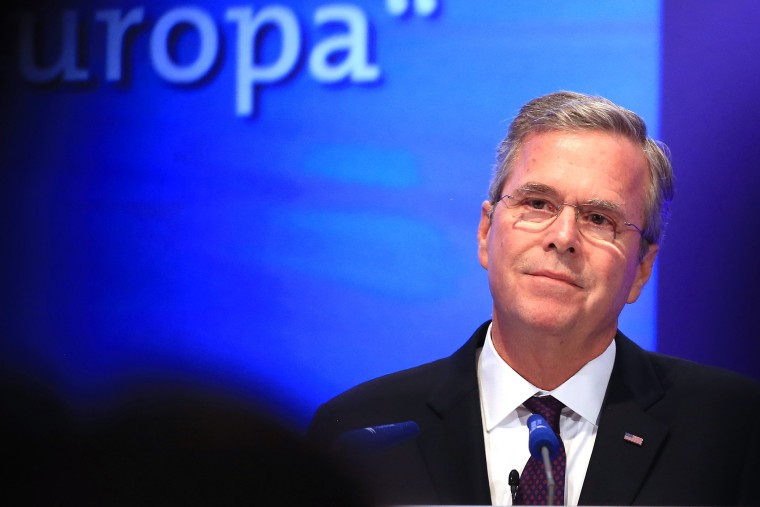It was a little jarring to learn this week that Jeb Bush, before he became Florida's governor, took some surprisingly far-right positions on social issued in a 1995 book. In Profiles in Character, for example, the Republican touted the benefits of public "shame" and a "sense of ridicule" for unwed mothers and those who rely on public assistance.
Jeb Bush even cited Nathaniel Hawthorne's The Scarlet Letter as support -- the novel served as a reminder, he wrote "that public condemnation of irresponsible sexual behavior has strong historical roots."
In fairness, the book was published 20 years ago. The Florida Republican can't simply walk away from his record, but it's not unreasonable to think candidates of every stripe are going to change and adapt to changing circumstances over the course of two decades. If Bush wanted to say he's learned a lot since 1995, it's an understandable response.
But that's what made yesterday so interesting. As msnbc's Benjy Sarlin reported, Bush was given a chance to walk back what he wrote in 1995, and instead, he did the opposite.
Asked by msnbc whether his views regarding the application of shame had changed, Bush suggested his book's warning had proved prophetic and stressed the importance of encouraging young people to get married before having children. "My views have evolved over time, but my views about the importance of dads being involved in the lives of children hasn't changed at all," he said. "In fact, since 1995 ... this book was a book about cultural indicators [and] the country has moved in the wrong direction. We have a 40-plus percent out-of-wedlock birth rate."
There's video available of Bush, who made the comments in Poland during a European campaign swing, making the comments while talking to reporters.
It's possible the GOP White House hopeful doesn't fully appreciate the nature of the controversy.
If Jeb Bush wants to make the case the children benefit from larger support networks, fine. If he wants to talk about the enormous challenges facing young, unwed mothers, no problem. If he wants to argue that two parents are better than one, we can at least have a conversation about the available social science.
But in his book, Bush went much further, touting the societal benefits of shame, even for those in poverty. He literally wrote about the value in a "sense of ridicule."
This isn't just rhetoric about old-fashioned affinity for a traditional nuclear family; Bush's vision went much further.
And given a chance to clarify his book 20 years later, Bush declined.
It's worth noting that during Bush's tenure in Florida, the state had a law "that required single mothers who did not know the identity of the father to publish their sexual histories in a newspaper before they could legally put their babies up for adoption." Bush eventually repealed the law following a successful court challenge.
When msnbc's Sarlin asked the former governor yesterday about the policy, Bush said he was fuzzy on the details, but he nevertheless seemed to support the purpose of the defunct law. "To assume you can create a fatherless society and not have bad outcomes I think is the wrong approach," he said yesterday. "I don't remember what the repeal was, I can remember the purpose of the law was to enhance the ability to collect child support because men have the responsibility of taking care of their children."
This may very well be the kind of rhetoric that resonates with Republican primary voters, but for the American mainstream, it's a stretch.
